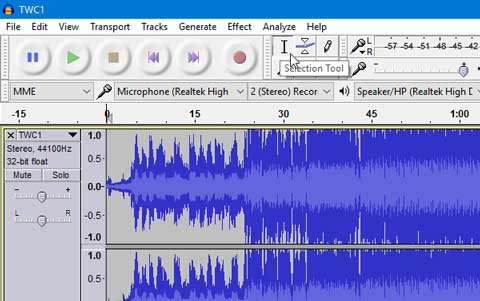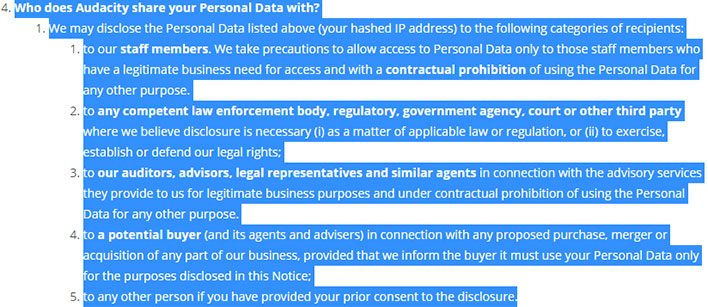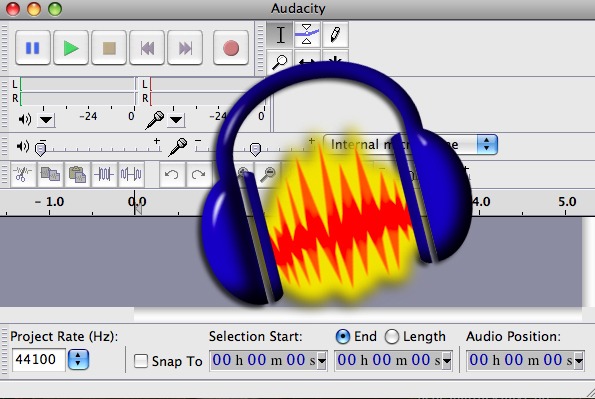

- OPEN AUDIO EDITOR AUDACITY BECOME SPYWARE UPDATE
- OPEN AUDIO EDITOR AUDACITY BECOME SPYWARE SOFTWARE
- OPEN AUDIO EDITOR AUDACITY BECOME SPYWARE LICENSE
- OPEN AUDIO EDITOR AUDACITY BECOME SPYWARE OFFLINE
Current and older versions don't have any networking features and they won't collect any data.Īt best, this was a case of miscommunication which caused concern among Audacity users. The policy will only come into force with the next version of the software, 3.0.3.
OPEN AUDIO EDITOR AUDACITY BECOME SPYWARE OFFLINE
The updated privacy policy does not apply "to offline use of the application," so if you block Audacity's access to the internet, it shouldn't be an issue.
OPEN AUDIO EDITOR AUDACITY BECOME SPYWARE LICENSE
The General Public License under which Audacity is distributed doesn't allow restrictions on the use of software. Ray didn't address a privacy policy request for users aged under 13 not to use the app. The limited data collection is necessary because of two new features in the upcoming version of Audacity, according to Ray: a way to automatically check for updates, and the optional error reporting.


The company is working with its legal team on a revised, clearer version of the policy, which it plans to publish soon. "We do understand that unclear phrasing of the Privacy Policy and lack of context regarding introduction has led to major concerns about how we use and store the very limited data we collect," Muse Group's head of strategy Daniel Ray wrote on GitHub. It is open-source, cross-platform, and supports multi-track recording and editing. Audacity is one of the best free audio editors you can find. The data collection is "a standard policy requirement for providing services in many jurisdictions, regardless of the depth of data collected or nature of service," the company said. Bear Audio Editor Beautiful Audio Editor 1. It won't hand over user information following a law enforcement request or otherwise sell or share data. Muse Group added it will only share data if required by a court in a jurisdiction in which it operates. Users' IP addresses are stored in a readable format for 24 hours before they become "pseudonymized and irretrievable." Muse Group says it will only collect "very limited" data (operating system version, processor type, IP address and opt-in error reports) from Audacity users. The company has attempted to clear up the controversy, which it says is primarily down to "unclear phrasing in the Privacy Policy,” as Music Radar reported.
OPEN AUDIO EDITOR AUDACITY BECOME SPYWARE SOFTWARE
That led to claims from users that the software was becoming "spyware." It stated that Muse Group will collect users' personal data and possibly share that information with third parties, including law enforcement and potential buyers. An open-source program, Audacity was first launched in 2000 and is popular with users worldwide for purposes such as podcast or music editing.
OPEN AUDIO EDITOR AUDACITY BECOME SPYWARE UPDATE
Furthermore, the company has clarified that the privacy policy won’t apply to offline use.Muse Group, the new owner of audio-editing app Audacity, caused a stir in recent days with an update to the software's privacy policy. The audio-editing software Audacity has denied claims that its new privacy policy amounts to it becoming ‘potential spyware’. The audio editor won’t collect any additional data, and it won’t share it with law enforcement until compelled by a court of law. It will collect limited data, including IP addresses, basic system info (OS version and CPU type), and error reporting data (optional). In the meantime, we would like to clarify what seem to be the major points of concern.” The post further states that Audacity will not sell any user data or share it with third parties. In a recent post on GitHub, the company states: “We believe concerns are due largely to unclear phrasing in the Privacy Policy, which we are now in the process of rectifying. However, the company has now released another statement clarifying the new privacy policy terms. This worried users about the telemetry data being collected and what it could be used for. A few days ago, many users discovered that Audacity had updated its privacy policy to include a clause that would allow Muse Group to collect “data necessary for law enforcement, litigation and authorities’ requests,” among other things.


 0 kommentar(er)
0 kommentar(er)
